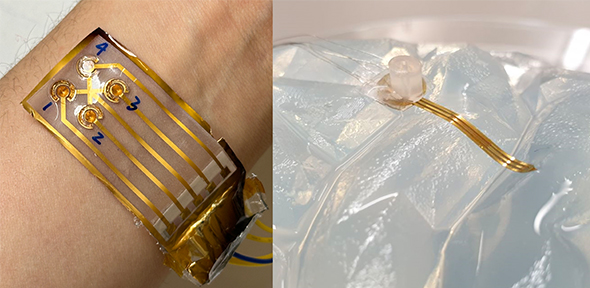
Cambridge neuroscientist Dr Flavia Mancini has joined a landmark research consortium aiming to revolutionise the treatment of chronic pain through personalised neurotechnology.
By grounding our work in computational theory and harnessing advanced neurotechnology, we aim to design interventions that precisely target the neural processes driving pain and adapt in real time as those processes change.
Dr Flavia Mancini
The EPIONE programme – Effective Pain Interventions with Neural Engineering – is a six-year, £11 million project backed by the Engineering and Physical Sciences Research Council (EPSRC) and the Medical Research Council (MRC). It is led by the University of Oxford in collaboration with the University of Cambridge, University of Glasgow and UCL, clinicians at NHS pain clinics and leading representatives from industry, both multi-nationals and SMEs, to translate new concepts into clinical treatments.
EPIONE combines expertise in biomedical engineering, neuroscience and clinical medicine with input from people who live with chronic pain[1], who play a key role in shaping the design of new interventions. By closely integrating these perspectives, the consortium aims to pioneer personalised treatments fundamentally different from current approaches.
Dr Mancini, Assistant Professor in Innovative Computational Methods and Medical Research Council (MRC) Career Development Fellow, will oversee all the theoretical aspects of the programme and will guide the development of the neurotechnologies.
Chronic pain has diverse biological and psychological contributors, and in many cases it persists because the nervous system adapts in ways that maintain or amplify pain signals. By combining advanced sensors, neuromodulation technologies and computational models of pain processing, EPIONE aims to create personalised therapies that directly target the mechanisms sustaining chronic pain.
Over the course of the programme, the researchers expect to deliver several world-first technologies, including:
- An adaptive brain implant that sense and respond to pain signals in real time, ready for clinical trials at scale for ultimate NHS approval.
- An implantable ‘closed-loop’ drug delivery system, which automatically adjusts medication based on a patient’s needs, minimising side effects and risk of addiction.
- Non-invasive ultrasound and magnetic stimulation techniques capable of targeting multiple brain regions at once.
- A combined “smart” therapy system that links brain sensors with feedback and stimulation technologies, helping patients actively retrain their brains to manage pain.

Left: Prototype of a flexible skin patch as a wearable device to control nerve signals. Right: Prototype of a soft, flexible implant that could precisely deliver drugs to specific areas of the brain or nerves. Credit: Yixuan Leng, Massimo Mariello, Oxford bioelectronics, Christopher Proctor.
Dr Mancini said: “Chronic pain affects one in five people worldwide, yet current treatments often fail to provide sufficient relief. EPIONE will allow us to rethink pain therapy from the ground up by combining neuroscience, engineering and data-driven personalisation. My role will focus on understanding the brain’s pain networks and designing technologies that adapt to each individual’s biology. Traditional treatments often target symptoms rather than the underlying mechanisms that sustain chronic pain. By grounding our work in computational theory and harnessing advanced neurotechnology, we aim to design interventions that precisely target the neural processes driving pain and adapt in real time as those processes change.”
Professor Tim Denison from the Department of Engineering Science at the University of Oxford said: “Each of EPIONE’s members are world-renowned experts in their own field, and the programme is unique in bringing this level of expertise to work together closely on such a highly integrated project.”
Professor Ben Seymour, who co-leads the Pain Theme at the NIHR Oxford Health Biomedical Research Centre, added: “Neurotechnology has the potential to realise substantial impact on reducing the burden of chronic pain in the UK and worldwide. But to date, this has not been realised – chiefly because this requires combining diverse expertise to engineer integrated therapeutic systems and translate these into clinical delivery. EPIONE will address this by leveraging Oxford’s strengths in interdisciplinary research to design a new generation of pain technologies.”
This research is funded by the EPSRC and Medical Research Council (MRC) Research Grant Scheme under the reference number UKRI1970.
Adapted from a University of Oxford news article.
---
[1] Chronic pain, a leading global cause of disability, is one of the great unmet needs in medicine. In the UK alone, between one-third and one-half of the adult population (just under 28 million) are affected by chronic pain, costing health services millions in direct treatment, with indirect costs in lost productivity estimated to be billions. But despite its scale, progress in chronic pain treatments has stalled with few major breakthroughs in drug therapies for several decades.

